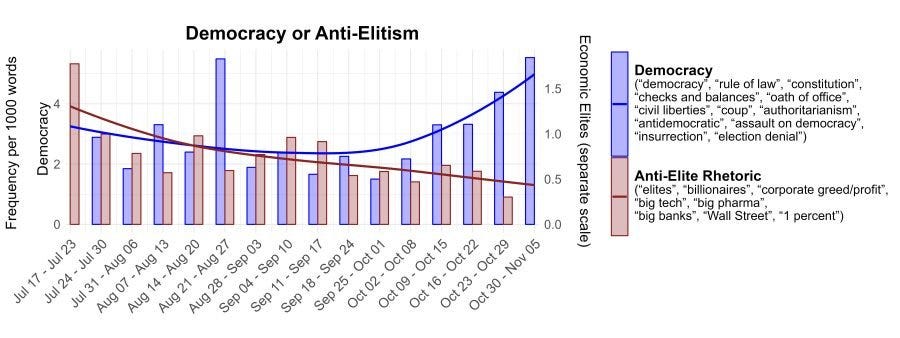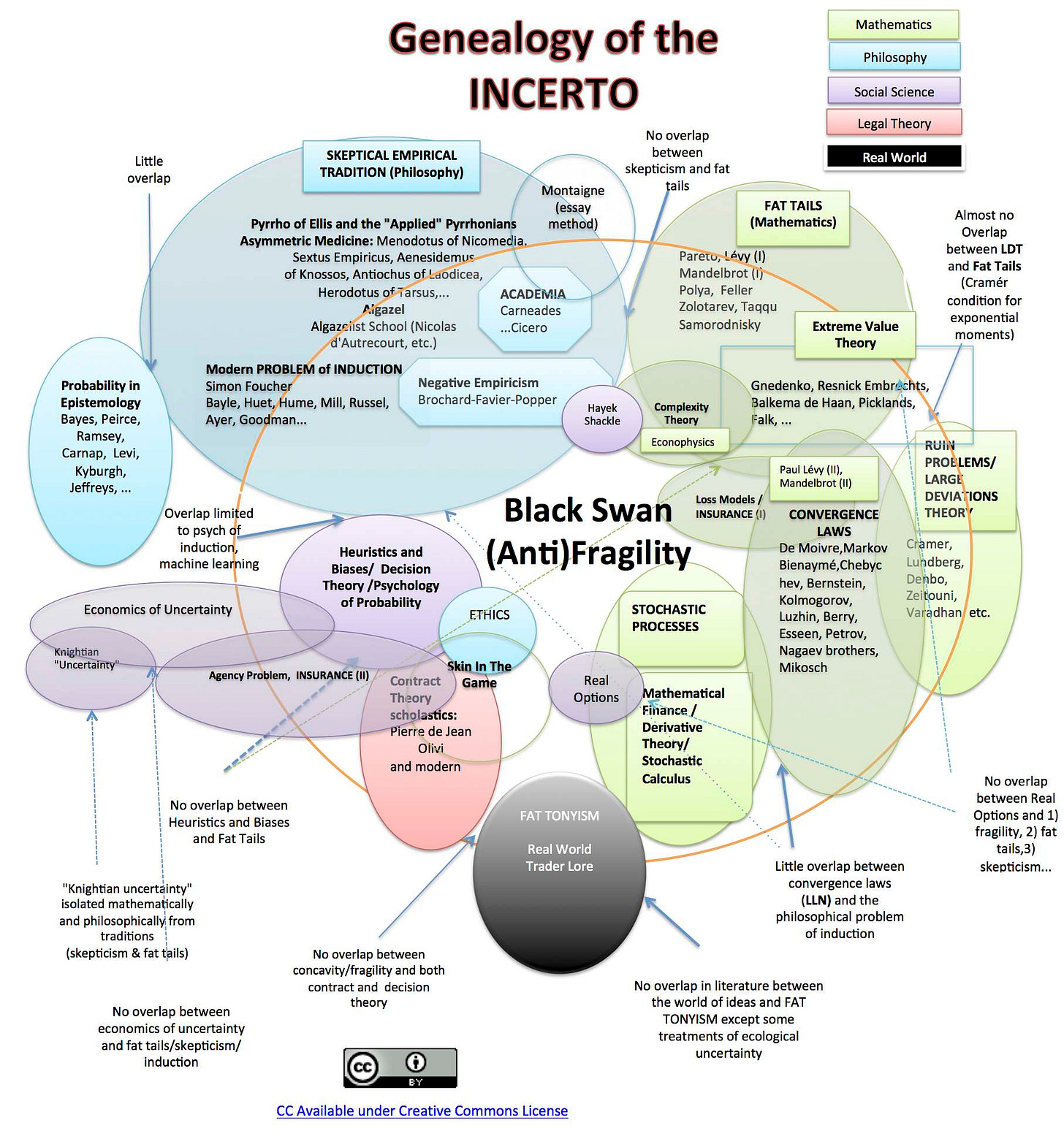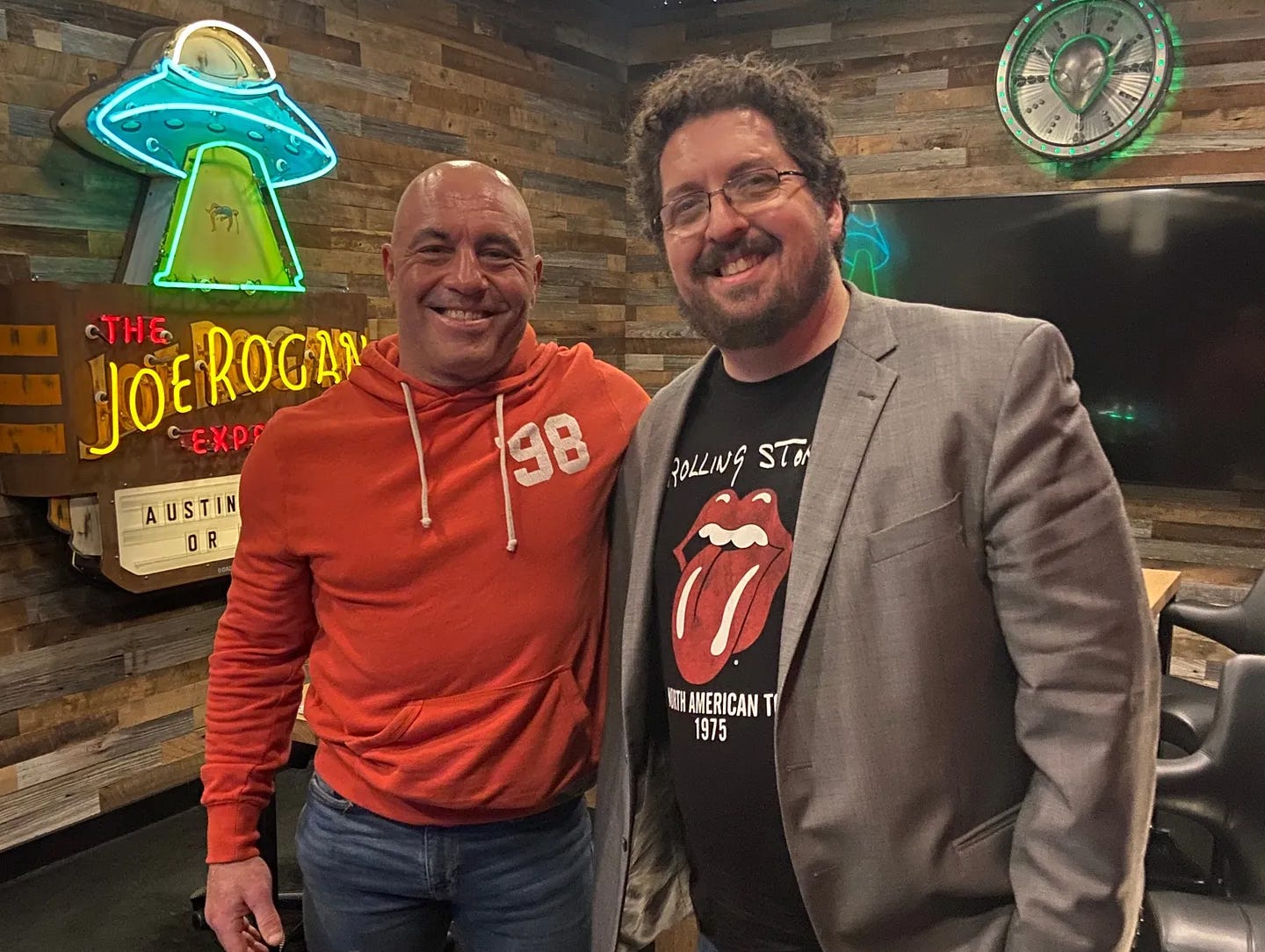Hello loyal readers of Theo’s Take. Here’s my second-ever miscellany post, chock-full of wacky and cool things I’ve stumbled upon lately. My first miscellany post can be found here.
Before we get to the good stuff: I’ve set up a birthday fundraiser through Giving What We Can for a few important causes: the Nuclear Threat Initiative’s biological policy program, the Against Malaria Foundation, and the Recommended Charity Fund from Animal Charities Evaluator. Please take a look, consider contributing, and send the link around. Thanks a ton to everyone who donates!
Now on to the peasant revolts:
I wanted to know which economic system was most prone to peasant revolts and I couldn’t find any legit data on this question1, so I scraped the List of Peasant Revolts Wikipedia page and made a database.
I then asked Perplexity AI to add in “economic system” as a variable to the dataset, and now I have some nice visualizations. I’m surprised capitalism is more prone to revolts than feudalism, and this makes me doubt the veracity of the data. Find further discussion in the footnotes.2
If you have an idea about where to get better data or how to test my question about which economic system is most prone to violent revolt, let me know. As someone who doesn’t want to die in a peasant revolt, I have a vested interest in knowing which economic system is best.
French historian Roland Mousnier on the reason peasants revolt under feudalism:
The underlying cause of seditions, and of what gives rise to them, is original sin and man’s refusal to obey the commandments of God. But understanding the “why” of phenomena does not relieve us of the task of discovering the “how.”
From a 2018 article by James Risen in the Intercept in which he explains how the CIA once tried to secretly give purposefully shoddy nuclear bomb designs to the Iranians.:
While covering the CIA for the Los Angeles Times and later the New York Times, I found that patiently listening to my sources paid off in unexpected ways. During one interview, a source was droning on about a minor bureaucratic battle inside the CIA when he briefly referred to how then-President Bill Clinton had secretly given the green light to Iran to covertly ship arms to Bosnian Muslims during the Balkan wars. The man had already resumed talking about his bureaucratic turf war when I realized what he had just said and interrupted him, demanding that he go back to Iran. That led me to write a series of stories that prompted the House of Representatives to create a special select committee to investigate the covert Iran-Bosnia arms pipeline. Another source surprised me by volunteering a copy of the CIA’s secret history of the agency’s involvement in the 1953 coup in Iran. Up until then, the CIA had insisted that many of the agency’s internal documents from the coup had long since been lost or destroyed.
Later in the piece Risen recounts how the New York Times repeatedly repressed stories critical of the Bush Administration’s official story about Saddam Hussein in the lead-up to the Iraq War.
Kamala Harris’s campaign started out by pairing pro-democracy rhetoric with the populist, anti-elite sentiment that spoke to working-class voters, but it slowly replaced that anti-elite rhetoric with more of the “protecting democracy” and “Trump’s a fascist” stuff that Biden was so fond of (and that was not very popular among swing state voters).
Note the differently scaled y-axes ^ (why did they do this?).
Political art used to be so sick. We should bring this back:
Jack Goldsmith on SCOTUS and executive power:
Alito took issue with the Biden Administration's expansive view of executive authority, which held that the President can disregard congressional mandates if no party has standing to sue, leaving accountability solely to the ballot box rather than the judiciary.
So maybe this means SCOTUS won’t let Trump run roughshod over the Constitution?
Mathematician Jing Chen think that by modelling value on entropy, we fix many conceptual issues in economics. He’s written about this many times, but the core ideas are covered in this paper. He recently coauthored Entropy Economics with James K. Galbraith, whom I interviewed about the book:
My former classmate and intellectual arch-nemesis Calla Walsh is wrong about a lot, but this tweet of hers was pretty funny and on-point IMHO.
I have previously written about my issues with the Democratic Party.
From a 2014 Washington Post column:
The West must understand that, to Russia, Ukraine can never be just a foreign country. Russian history began in what was called Kievan-Rus. The Russian religion spread from there. Ukraine has been part of Russia for centuries, and their histories were intertwined before then. Some of the most important battles for Russian freedom, starting with the Battle of Poltava in 1709 , were fought on Ukrainian soil. The Black Sea Fleet — Russia's means of projecting power in the Mediterranean — is based by long-term lease in Sevastopol, in Crimea. Even such famed dissidents as Aleksandr Solzhenitsyn and Joseph Brodsky insisted that Ukraine was an integral part of Russian history and, indeed, of Russia.
The author of the column was none other than Henry Kissinger.
After three years of fighting in Ukraine, it’s worthwhile thinking about how we could have avoided this calamity. Robert Wright’s essay from the start of the war is very good:
The vibe shift is real and worrisome:
This great poem, Daedal, was published in 2020 by A. E. Stallings:
To build a labyrinth it takes A twisted mind, a puzzled art, A fractal branching of mistakes. Drag out the shovels and the rakes, The spirit level, sacred chart. To build a labyrinth it takes Shadows, stones, a way that snakes And ladders to its shaky start; An average mazing of mistakes, The kind that everybody makes, Set random intervals apart. To build a labyrinth it takes Dead ends that seem like lucky breaks, The paths of bats that weave and dart Through limestone caverns of mistakes. The shaken Etch A Sketch awakes A lost child buried in its heart. To build a labyrinth it takes Some good intentions, some mistakes.
Nahum Goldmann, founder of the World Jewish Congress and former president of the World Zionist Organization, reported that David Ben-Gurion once said this to him:
Why should the Arabs make peace? If I was an Arab leader I would never make terms with Israel. That is natural: we have taken their country. Sure, God promised it to us, but what does that matter to them? Our God is not theirs. We come from Israel, it's true, but two thousand years ago, and what is that to them? There has been anti-Semitism, the Nazis, Hitler, Auschwitz, but was that their fault? They only see one thing: we have come here and stolen their country. Why should they accept that?
Two interesting essays on American libertarianism, one by
(a leftist) and one by friend of the blog (a libertarian, AFAICT):Genealogy map of the topics covered Nassim Taleb in his books and essays:
When it comes to ethics, I’m pretty convinced of consequentialism. Friend of the blog
wrote a very nice essay about his journey from deontology to consequentialism (he’s not 100% convinced yet). Though he doesn’t go through all the main arguments on either side, the aspects of the debate that he emphasizes in the essay are what I believe to be the most salient ethical issues. I largely think along the same lines. In this passage, he sums up what I view as the most problematic aspect of deontology and other non-consequentialist moral philosophies:[A]ny theory that isn’t consequentialist will necessarily end up sometimes favouring other considerations over the interests of subjects. For example, deontology will sometimes tell you not to do what would be in people’s interests because there is some duty it would be against. In that case, you are weighing duties over the interests of subjects.
This argument for the existence of God is the first that’s ever really made me reconsider my staunch atheism:
It’s based on this paper by Brian Cutter and Dustin Crummett.
Universal pre-kindergarten has a 10x return on investment, according to this study.
UPK enrollment increases parent earnings by 21.7% during pre-kindergarten, and gains persist for at least six years after pre-kindergarten. Gains are largest for middle-income families. Earnings effects for parents have substantial consequences for cost-benefit analysis: tax revenue generated by parents’ income gains reduces the net government cost of UPK by 90% compared to what we would have found without data on parent earnings. Under the conservative assumption that families value UPK at the cost of provision, each dollar of government expenditure on UPK yields $10.04 in benefits.
Assal Rad on media coverage of the Gaza War:
Rather than challenging statements from the Israeli government and military, or the U.S. government which repeats without question whatever Israeli officials say, mainstream Western media has largely acted like stenographers of state-run media. In headline after headline, Western outlets have repeatedly failed to mention Israel at all when reporting death tolls from airstrikes in Gaza and Lebanon; used passive voice when attacks are actually attributed to Israel; cast doubt when Palestinians are killed; and dehumanized Palestinians with subtle differences in word choice used to describe Israelis.
Libertarian economist Walter Block responded to Burgis and made the Case for Laissez-Faire Capitalism.
Burgis responded to Block’s rejoinder.
Here’s the abstract from The Pedophile as a Human Being: An Autoethnography for the Recognition of a Marginalized Sexual Orientation, an article published in the Journal of Controversial Ideas in 2021:
By the general public and in the media, pedophilia as a sexual orientation is systematically confused with sexual abuse of minors. Neurological research supports the idea that pedophilia is an innate sexual orientation, and that is how pedophiles, in the sense of ‘minor-attracted persons,’ experience it themselves. The stigma attached to pedophilia as a sexual orientation ensures that pedophiles live in emotional isolation and that young people with pedophilic feelings have nowhere to turn with their doubts and fears. However, pedophiles are not destined to abuse children, and more openness about living with pedophilia can actually prevent child sexual abuse. In this article, based on an autoethnography, I want to provide more insight into what it means to grow up and live with a pedophilic orientation, and I want to make a case for turning the pedophile into a human being again.
Poems by philosopher Nick Bostrom
Here’s an excerpt from The Center Must Rise, a very good essay by
:The Republicans have grappled with the institutional crisis, but their solution so far has mostly been to build worse institutions: more openly partisan, more sensational, more conspiratorial, and less committed to truth than mainstream ones, even as mainstream institutions have fallen victim to capture and have declined.
The Democrats have not begun to grapple with it. They are the party of defending the institutions: Trust the experts, trust the science, trust the government, trust that everything is functioning well and that adults are in charge and that any criticism is all smoke and no fire. This election, that refusal to grapple with the crisis culminated in their worst electoral loss in decades.
Aside from this seemingly now-defunct project from the University of Oregon
More peasant revolt stuff:
As a friend of mine pointed out, it’s kind of silly to regard “early communism” as the most volatile economic system (the one that’s most prone to peasant revolts) because “early communism” to a certain extent is definitionally the same as “peasant revolt.” And “mercantilist” is really a trade policy, not an economic regime, so those probably ought be considered feudal as well.
Weird Data
This Wikipedia page probably selects for peasant revolts in more recent centuries, which were more likely to be recorded. And it has no casualty data or any measure of the intensity or size of the revolt. Probably some revolts that could be considered part of one movement are denoted as separate events (like the series of Russian peasant uprisings against the Bolsheviks in 1918), whereas long rebellions like the Caste War of Yucatán (1847-1915) could be considered a series of many separate revolts.
Note that the way these revolts are sorted by economic system is very much open to debate. I don’t have the time to got through all the data and assign economic system as I see fit according to my knowledge of history, so for the time being we’re stuck with what Perplexity AI thinks. It seems to me that the two revolts that took place in “agrarian” Haiti ought to really be categorized as “early capitalism,” and the “agrarian” revolts in Mexico, Guatemala, and British Honduras from 1847 to 1915 should be considered “colonial capitalism.”
Though this probably reflects the poor quality of the data, the frequency at which peasant revolts occur is increasing. Perhaps peasants didn’t really revolt up until the Middle Ages for some reason, and then they started revolting more and more once they had the means. This could also reflect population growth.
Here’s a somewhat wacky data visualization that looks cool:
I couldn’t attach a CSV file, so here’s the PDF:




















